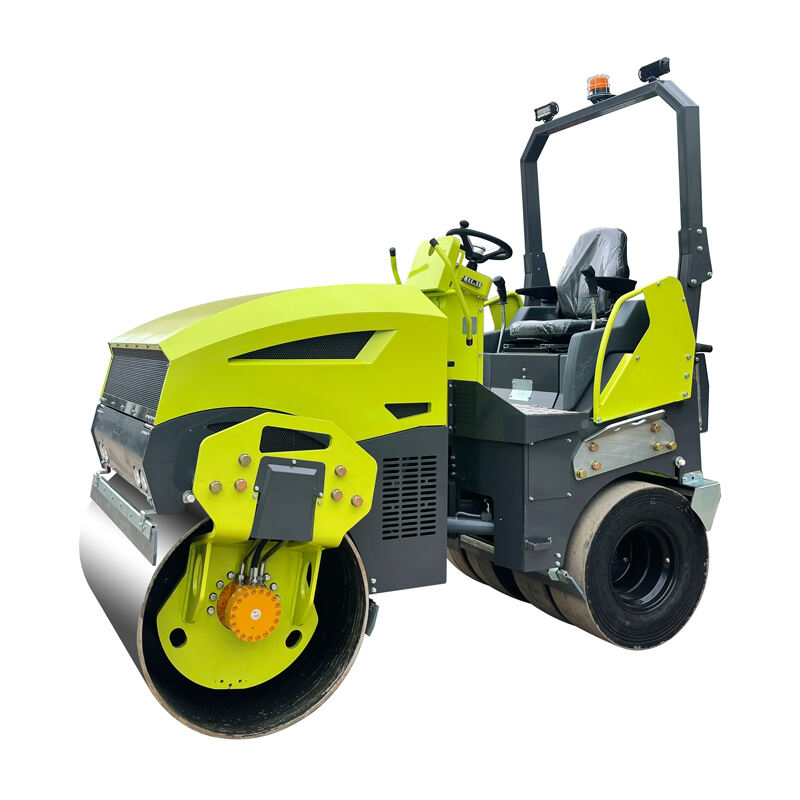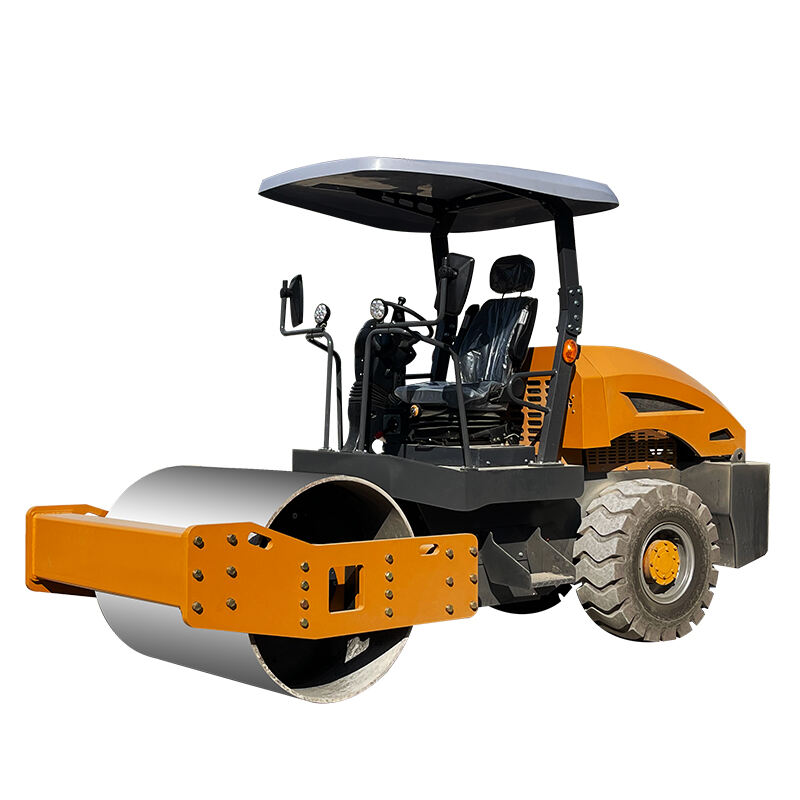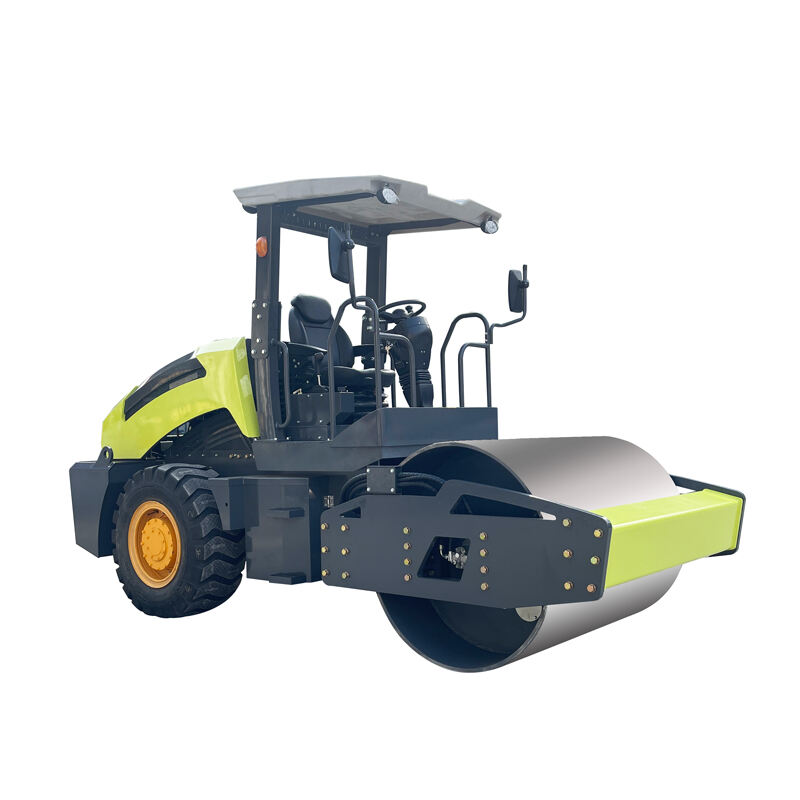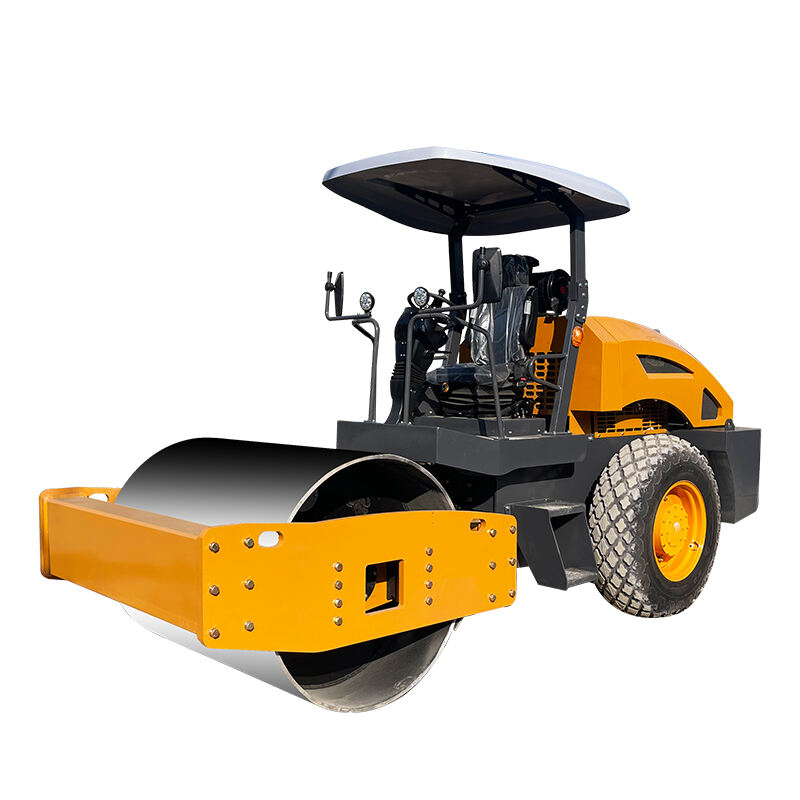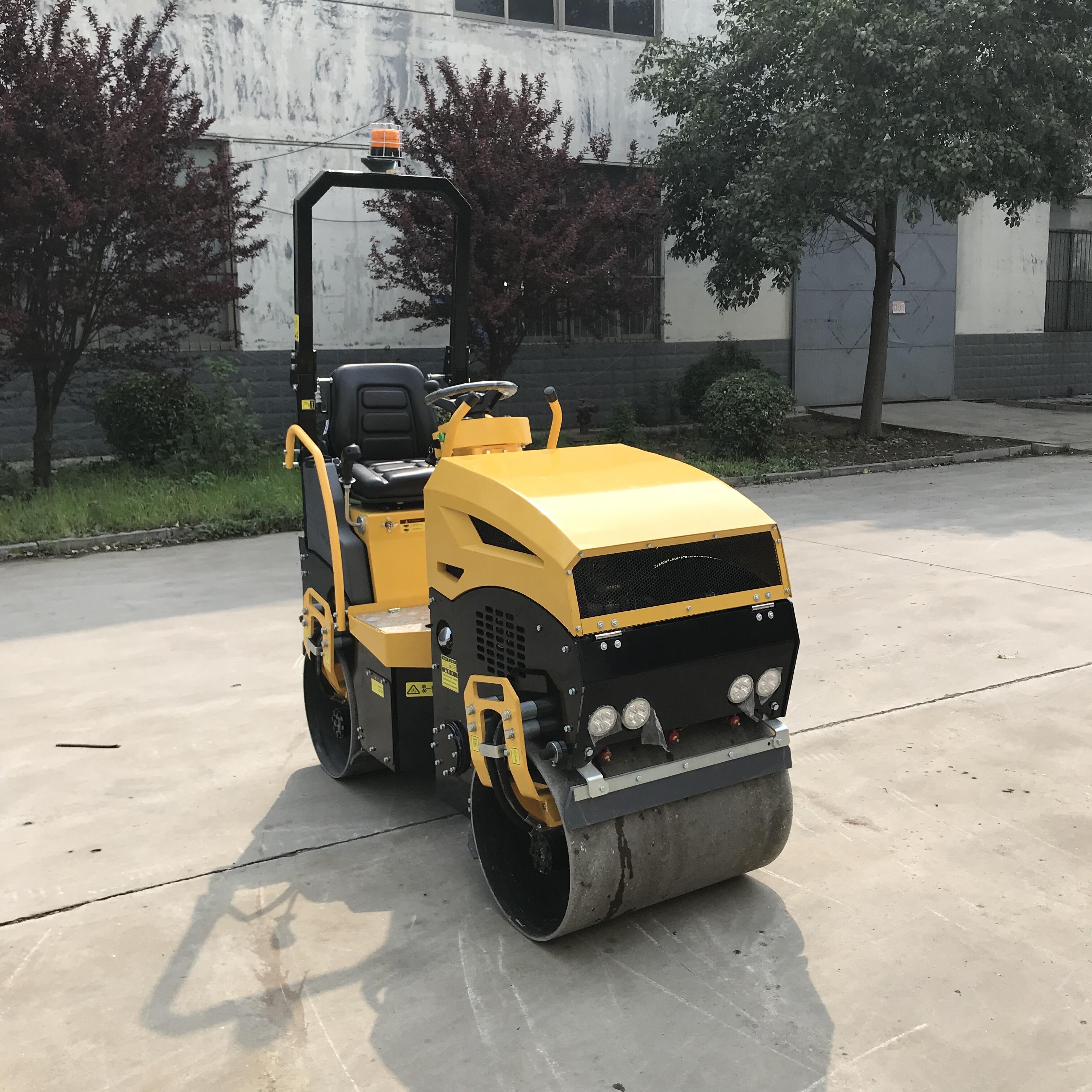دُهُن الطريق: المعدات الرئيسية لبناء طرق ذات جودة عالية
الدور الحاسم لماكينات دهس الطرق في بناء الطرق الحديثة
لماذا يهم الضغط لاستدامة الإسفلت
إن تحقيق درجة جيدة من الدمج أمر بالغ الأهمية لتحديد مدة عمر الطرق الإسفلتية. تشير الأبحاث إلى أن الإسفلت المُدمج بشكل صحيح يمكن أن يطيل عمر الطرق بشكل كبير مع تقليل تكاليف الإصلاح على المدى الطويل. عندما لا يتم الدمج بشكل صحيح، تبدأ الشقوق بالظهور على السطح بسرعة، ويتميل الطريق ككل إلى الفشل قبل موعده المتوقع، مما يضعف الأساس الهيكلي. تشدد معظم إرشادات البناء على أهمية الوصول إلى نسب الدمج المستهدفة لتجنب كل هذه المشكلات. إن المطاحن الثقيلة هي الأداة الأساسية التي تحقق هذا الدمج عبر طبقات مختلفة من المزيج الإسفلتي. تضمن هذه الآلات توزيع الضغط بالتساوي بحيث يتم توزيع وزن المركبات بشكل صحيح دون التسبب في أي ضرر. يساعد الدوران المنتظم في الحفاظ على القاعدة الصلبة الموجودة أسفل السطح، مما يضمن تحمل الطريق بشكل أفضل ضد البلى والتمزق الناتج عن الحركة المرورية على مدار السنين.
مقارنة بين ماكينات دهس الطرق ومعدات الضغط الأخرى
توجد العديد من أدوات التعبئة المختلفة في السوق، لكن المُدَكِّات (Road Rollers) تتميز حقًا عند العمل على الأسطح الإسفلتية بسبب تصميمها. عند مقارنتها ببدائل مثل المُدَكِّات ذات الألواح أو الألواح الاهتزازية، فإن المدكات تؤدي العمل بسرعة أكبر وتخترق المواد بشكل أعمق، وهو أمر مهم جدًا للمشاريع الإنشائية الكبيرة. سيؤكد معظم المقاولين لأي شخص يستفسر أن المدكات تتفوق على المنافسين بفضل الأسطوانات الثقيلة والطريقة التي يتم بها توزيع الوزن عبر الجهاز. والنتيجة؟ يتم تعبئة المواد بشكل متساوٍ طوال مساحة العمل، مما يُنتج طرقًا أكثر متانة ونعومة تحت حركة المرور. ولأي شخص يقوم بمهام تبليط على نطاق واسع، فإن هذه المachines منطقية أكثر من محاولة تغطية كل شيء باستخدام معدات أصغر.
أنواع مكابس الطرق لمتطلبات البناء المختلفة
مكابس اهتزازية: مثالية للتربة الكثيفة وطبقات الإسفلت
في أعمال بناء الطرق، أصبحت المداحل الاهتزازية ضرورية إلى حد كبير لأنها تؤدي المهمة بشكل أسرع عند التعامل مع التربة الصلبة وطبقات الإسفلت السميكة. الطريقة التي تعمل بها هذه الآلات ذكية بالفعل، حيث تطلق اهتزازات من خلال تلك الأسطوانات الكبيرة، مما يساعد على توزيع الطاقة بشكل أفضل أثناء عملية التماسك. ما يحدث بعد ذلك هو أمر في غاية الأهمية: تقل المسافات بين الجسيمات في المادة بشكل ملحوظ، مما يجعل الطرق أكثر صلابة ويدوم عمرها الأفتراضي أطول. تؤكد التجارب الميدانية هذا الأمر أيضًا، حيث تشير الأرقام باستمرار إلى أن الموديلات الاهتزازية تنجح في تقليل الجيوب الهوائية أكثر من المداحل الثابتة العادية. ولذلك يلجأ معظم المقاولين إليها في بناء الطرق السريعة أو أي طرق تحتاج إلى قوة تحمل كبيرة تحت ظروف حركة مرور مكثفة. علاوةً على ذلك، وبما أنها توزع عملية التماسك بشكل متساوٍ على كامل مساحة السطح، فإننا نحصل على طرق تتحمل بشكل أفضل مع مرور الوقت مختلف الظروف الجوية والاستخدامات.
المداحل الساكنة: تثبيت دقيق للأسطح النهائية
تُعدّ الأسطوانات الثابتة مهمة للغاية عند الحاجة إلى دكّ دقيق يُنتج تشطيبات سطحية جيدة. تعمل هذه الآلات بشكل مختلف عن الأسطوانات الاهتزازية لأنها تعتمد على الوزن الفعلي المُطبَّق عبر طبلاتها لتثبيت المواد في مكانها. ويجعلها ذلك مناسبة لإنشاء تلك الأسطح الأسفلتية الملساء التي نراها على الطرق. إن إلقاء نظرة على مشاريع البناء المختلفة في جميع أنحاء البلاد يُظهر الفرق الكبير الذي يمكن أن تحدثه هذه الأسطوانات الثابتة بالنسبة للملمس والمتانة طويلة الأمد للأسطح. ما يميزها هو بساطة تشغيلها واعتماديتها الكبيرة أثناء مراحل التشطيب النهائية في بناء الطرق. وتُبرِز الأسطوانات الثابتة أداءً مميزًا في الحالات التي يحتاج فيها المشغلون إلى الحرص الشديد على عدم إتلاف الأسطح الحساسة، مع تحقيق النتيجة النهائية المطلوبة التي يرغب الجميع في رؤيتها.
المقارنة بين أسطوانة التاندم وأسطوانة الإطارات الهوائية
عند اتخاذ قرار بين المداحل الأسطوانية الثنائية والمداحل ذات الإطارات الهوائية، فإن الأمر يعود في النهاية إلى طبيعة العمل والأرض التي نعمل عليها. تمتلك المداحل الأسطوانية الثنائية أسطوانتين فولاذيتين كبيرتين تقومان بعمل ممتاز في دكّ المواد، خاصةً عندما نحتاج إلى تشطيب ناعم بعد إنشاء الطرق أو وضع الأسفلت. وتعمل هذه المداحل بشكل أفضل على الأراضي المستوية حيث نريد نتائج متسقة عبر كامل المنطقة. أما المداحل ذات الإطارات الهوائية فتتبع نهجاً مختلفاً. بدلاً من الأسطوانات الفولاذية، فهي مزودة بعدد من الإطارات المطاطية التي تعمل على عجن المادة أثناء مرورها فوقها. وهذا يساعد على إحكام الإغلاق بشكل أفضل لأن الإطارات تنثني وتتكيّف مع أي سطح تتعامل معه. ولكن الجانب السلبي هو أن هذه الإطارات تتآكل بسرعة نسبياً، وبالتالي تصبح الصيانة أمراً يجب مراقبته بانتظام. ومع ذلك، لا يزال معظم المقاولين يفضلون استخدام المداحل الأسطوانية الثنائية عندما تكون الدقة هي العامل الأهم، ولكن إذا كانت التضاريس متغيرة باستمرار أو توجد أرض غير مستوية، فإن المداحل ذات الإطارات الهوائية تكون عادة الخيار الأفضل، رغم الحاجة إلى عناية أكثر.
كيف تحقق مكابس الطرق ضغط الأسفلت الأمثل
العلم وراء تردد الاهتزاز والامplitude
تلعب تردد الاهتزاز وسعته دوراً مهمّاً للغاية في تحديد مدى جودة دمج الأسفلت أثناء أعمال البناء. يقوم مشغلو المدحلة بتعديل هذه الإعدادات بناءً على نوع المادة التي يعملون بها، بحيث تقوم الآلة بنقل الطاقة بشكل صحيح وضغط كل شيء بالضبط كما يجب. أظهرت الدراسات أن اختيار إعدادات الاهتزاز بشكل صحيح يُعدّ أمراً بالغ الأهمية إذا أردنا تحقيق مستويات الكثافة المناسبة عبر مختلف أنواع المواد وظروف الطقس أيضاً. خذ على سبيل المثال طبقات الأسفلت الرقيقة، فهذه عادةً ما تستجيب بشكل أفضل للاهتزازات ذات التردد العالي. أما الطبقات السميكة فتحتاج عموماً إلى تردد منخفض بدلاً من ذلك. يعرف معظم المقاولين هذا الأمر مسبقاً، لكنهم ما زالوا بحاجة للتفكير بعناية في الإعدادات الأنسب لكل موقع عمل. يساعدنا التوصل إلى هذه الأمور على التأكد من أن المدحلة تقوم فعلياً بمهتمها بكفاءة، دون إهدار الوقت أو الموارد على تقنيات غير صحيحة للدمج.
إدارة درجة الحرارة أثناء عمليات الرصف
عند وضع الأسفلت، يلعب التحكم في درجة الحرارة دوراً كبيراً لتحقيق نتائج جيدة في عملية الدمج. يجب العمل على المادة بينما لا تزال دافئة بما يكفي، وعادة ما تكون درجة الحرارة بين 275 و300 درجة فهرنهايت. إذا لم تتماشى درجات الحرارة مع هذه الأرقام، فإن عملية الدمج لن تتم بشكل صحيح، مما يؤدي لاحقاً إلى مشاكل مثل تشكل الشقوق أو تآكل الطريق بشكل أسرع من المتوقع. في الوقت الحالي، يمتلك المقاولون أدوات يمكنهم استخدامها لمراقبة كل شيء. على سبيل المثال، توفر مقياس الحرارة بالأشعة تحت الحمراء قراءات فورية، كما تضمن أجهزة الاستشعار المتصلة عبر نظام تحديد المواقع العالمي (GPS) ألا يتم تجاهل أي مكان أثناء عملية الدمج. تنشر جهات مثل الجمعية الوطنية للرصف الأسفلتي توصيات مفصلة حول درجة الحرارة التي يجب الحفاظ عليها خلال مراحل العمل المختلفة. عندما تتبع الشركات تلك التوصيات فعلياً وتستخدم المعدات الحديثة بشكل صحيح، فإنها تصل إلى طرق تدوم لفترة أطول وتبدو أفضل منذ اليوم الأول.
الاعتبارات الرئيسية عند اختيار معدات بناء الطرق
حجم المشروع وتصنيفات وزن الدوّاس
البدء بمشروع بناء الطرق يعني معرفة مدى تأثير حجم المشروع في نوع المدحلة المستخدمة. تأتي المدائح بأوزان مختلفة وتؤدي وظائف مختلفة، لذا فإن اختيار النوع المناسب أمر بالغ الأهمية للحصول على نتائج جيدة في عملية التماسك. عادةً ما تكون الأعمال الصغيرة مناسبة للمدائح الخفيفة التي تعمل في المساحات الضيقة دون التسبب في أضرار. أما الطرق الأكبر فتتطلب آلات أثقل يمكنها دك الطبقات الأعمق بشكل صحيح. إن المقاولين الذين يفهمون هذا الاختلاف الأساسي يتخذون قرارات أكثر ذكاء بشأن اختيار المعدات بناءً على متطلبات المشروع الخاصة. عند معاينة موقع جديد، يتحقق الطاقم المتمرس من ثلاث نقاط رئيسية قبل اتخاذ قرار بشأن المعدات: ما هي المهمة التي يجب إنجازها بالضبط، كم المساحة المتاحة فعليًا للعمل، وما نوع التربة التي يتم التعامل معها. هناك علاقة وثيقة بين اختيار المعدات المناسبة للمشروع وتحقيق نتائج جيدة في النهاية. إن الاختيار الخاطئ في هذه المرحلة قد يؤدي إلى مشاكل عديدة لاحقًا، بدءًا من جودة الرصف المنخفضة وانتهاءً بإعادة العمل بتكاليف باهظة.
تحليل كفاءة استهلاك الوقود وتكلفة الصيانة
إن كمية الوقود التي تستهلكها ماكينة التسوية تؤثر حقًا في تكلفة امتلاكها وتشغيلها، خاصةً عند العمل في مواقع البناء الكبيرة التي تعمل فيها الماكينات طوال اليوم في كل يوم. تختلف معدلات استهلاك الوقود حسب نوع الماكينة، مما يُحدث فرقًا كبيرًا في كمية الأموال التي تُنفق شهريًا. تُظهر الأبحاث أن الموديلات الحديثة من ماكينات التسوية والماكينات المستخدمة في دك الأسفلت تستهلك عمومًا كمية وقود أقل من الموديلات القديمة، مما يقلل من المصروفات مع مرور الوقت. خذ على سبيل المثال الموديلات المزودة بمحركات حديثة وأنظمة هيدروليكية محسنة، فعادةً ما تستهلك كمية وقود قليلة مقارنةً بالموديلات القديمة دون التأثير على الأداء. لكن يبقى الصيانة بنفس القدر من الأهمية. يجد المقاولون الذين يتمسكون بجداول الصيانة الدورية، مثل تغيير الزيوت بانتظام وتوفير التزييت الجيد واستبدال القطع التالفة قبل أن تتلف تمامًا، أن معداتهم تدوم لفترة أطول وتعمل بشكل أفضل. إن الالتزام بهذا الروتين يساعد في الحفاظ على سير العمليات بسلاسة دون حدوث أعطال مفاجئة تؤثر على الأرباح. إن الاطلاع على أرقام الاستهلاك الفعلية ومراجعة التقارير الصادرة عن القطاع يمنح المقاولين بيانات واقعية يمكن الاعتماد عليها لاختيار المعدات التي توازن بين التكلفة الأولية والتكاليف التشغيلية على مدى سنوات الاستخدام.
ضوء السبوت라이ت على مكابس طرق Storike: حلول موثوقة للمقاولين
ST4500C 4.5 طن إطارات مركبة رولر طريق اهتزازي
يتميز محضر ST4500C ذو الإطارات المركبة 4.5 طن والماركة بجودة تصنيع ممتازة وتقنيات متقدمة في الدمج بين الإحمال الاهتزازي والدحرجة الثابتة من خلال إطارات مركبة خاصة، مما يمنح المشغلين مرونة حقيقية في التعامل مع مختلف الظروف الأرضية. يُعتبر هذا الجهاز فعالًا جدًا وفقًا لآراء الكثيرين في المجال، كما يتمتع بمتانة عالية ويعمل لفترات طويلة دون تعطل. وشارك مستخدموه تجاربهم حول تحقيق نتائج أفضل على الأسطح الطرقية الصعبة التي تواجه فيها الماكينات الأخرى صعوبات، حيث يستمر ST4500C في الأداء بقوة حتى بعد سنوات من الاستخدام الكثيف.
STS04 دهان 4 أطنان عجلة واحدة مهتزّة لدحرجة الطرق
يحب المقاولون استخدام المُدَكِّ STS04 ذي الـ 4 أطنان والأسطوانة الواحدة الاهتزازية عند العمل على مشاريع الأسفلت، وذلك لأنه يعمل بشكل جيد للغاية في مختلف الظروف. ما يميز هذه الآلة هو سهولة التشغيل إلى جانب الكفاءة الجيدة أثناء العمل. يتيح تصميمها للعمال التبديل بسهولة بين الطرق السكنية الصغيرة والمشاريع الأكبر مثل الطرق السريعة دون عناء يذكر. الأشخاص الذين يستخدمون هذه الآلات يومًا بعد يوم يلاحظون تحقيق نتائج جيدة وثابتة فيما يتعلق بعملية التماسك. كما يلاحظ الخبراء في المجال أيضًا أن المُدَك يحافظ على الكثافة المناسبة في طبقات الأسفلت دون التسبب في أي أضرار. عند مقارنتها بالطرازات الأخرى في السوق، فإن جهاز STS04 يتميز ليس فقط بسبب تكلفته المعقولة، ولكن أيضًا لموثوقية أدائه على المدى الطويل، مما يجعله استثمارًا مربحًا وفقًا للكثير من شركات الإنشاءات رغم التكلفة الأولية المرتفعة.
أداء قوي في الضغط STS06 6طن
تم تصميم المدحلة الطرقية STS06 بسعة 6 أطنان لتتعامل مع المهام الصعبة التي قد تواجه فيها الآلات الأخرى صعوبات. ما هو ميزة البيع الرئيسية لها؟ قوة الضغط المتفوقة التي تحدث فرقاً حقيقياً في مواقع البناء الكبيرة. تأتي الماكينة بقطع مُعززة تعمل بشكل ممتاز في الظروف القاسية، مما يمنح المقاولين سطحاً متيناً ومُسطحاً على مختلف أنواع مواد الأرض. عند المقارنة المباشرة مع المنافسين، يتميز هذا الطراز بقدرة ضغط أعمق وقوة تطبيق أعلى. ويشير العديد من المشغلين الذين استخدموها إلى حدوث أعطال أقل وقضاء وقت أقل في الإصلاحات، مما يُترجم إلى وفورات كبيرة على المدى الطويل. يحب أصحاب المواقع الإنشائية هذه المدحلة لأنها تقدم أداءً متميزاً في العمليات الفعلية، كما أن تكاليف الصيانة الخاصة بها منخفضة نسبياً.
STS08 مدمّس沥青 صناعي بوزن 8 أطنان
يتميز نموذج STS08 بسعة 8 أطنان بأنه آلة قوية حقًا تُستخدم في مشاريع الأسفلت الكبيرة عبر مواقع البناء. ما الذي يجعله مميزًا؟ حسنًا، إنه مزود بتحكم ذكي يساعد المشغلين على تحقيق سطح مستوٍ مثالي في كل مرة، بغض النظر عن نوع التضاريس التي يتعاملون معها. أفاد المقاولون الذين اختبروا هذه الآلة في مشاريع توسيع الطرق السريعة أو بناء مواقف السيارات بتحقيق نتائج أفضل بكثير مقارنة بالنموذج القديم. ذكر فريق واحد أنه تمكن من تقليص مدة تنفيذ المشروع بأسبوعين تقريبًا في مشروع تجديد حديث لمول تجاري لأن STS08 تعامل بكفاءة عالية مع تلك الأطنان من خليط الأسفلت الساخن. وبالإضافة إلى ذلك، وبحسب ما ذكره العمال في الميدان، فإن عملية الإعداد تستغرق بضع دقائق فقط بدلًا من الساعات، مما يعني أن الفرق يمكنها البدء في العمل بشكل أسرع والانتهاء مبكرًا أيضًا.
ماكينة دهس ذاتية القيادة بوزن طن واحد: قوة مدمجة للأماكن الضيقة
يُعدّ الراجلر ذو الحمولة الطُنّية (1 Ton Ride-On Roller) خيارًا قويًّا للمهام الصعبة في المدن حيث تكون المساحة محدودة للغاية. يعمل هذا الجهاز على إنجاز المهمة بدقة حتى في الظروف الصعبة، ويُحقِّق دكًّا كاملاً للمواد دون إحداث أي ضرر في المنشآت المحيطة. ما يلفت الانتباه حقًّا هو مدى الراحة التي يجدها المشغِّلون في التعامل معه طوال اليوم. تستجيب أدوات التحكُّم لديه بدقة لتوجيهات القيادة، مما يسمح بتجاوز العقبات التي قد تتسبب في توقُّف ماكينات أخرى تمامًا. لقد شهدنا أداءً مميزًا من هذه الراجلرات في مواقع البناء المنتشرة في مناطق وسط المدن، سواء في إصلاح الطرق أو تركيب الأرصفة. فهي تتعامل بكفاءة مع كل شيء، من الحصى إلى خلطات الأسفلت، دون أي عناء. كما يُقدِّر المقاولون هذه الراجلرات أيضًا لأنها تتمتّع بمتانة عالية على مر الزمن ولا تحتاج إلى تعديلات مستمرة. ويُعبِّر فنيو الصيانة عن تقديرهم لسهولة الوصول إلى القطع والأجزاء، مما يعني تقليل الوقت الذي يقضيه الجهاز في الورشة، وزادت الفترات التي يقضيها في العمل الميداني المُدرّ للدخل.
 EN
EN
 AR
AR CS
CS DA
DA NL
NL FI
FI FR
FR DE
DE IT
IT NO
NO KO
KO PL
PL PT
PT RO
RO RU
RU ES
ES SV
SV TL
TL ID
ID LV
LV SR
SR SK
SK SL
SL VI
VI SQ
SQ ET
ET TH
TH TR
TR AF
AF MS
MS GA
GA HY
HY KA
KA BS
BS LA
LA MN
MN MY
MY KK
KK UZ
UZ KY
KY

